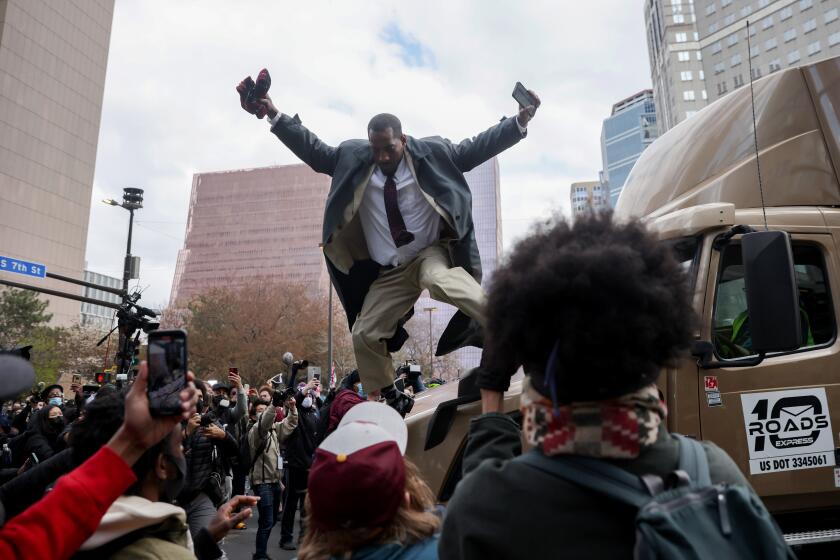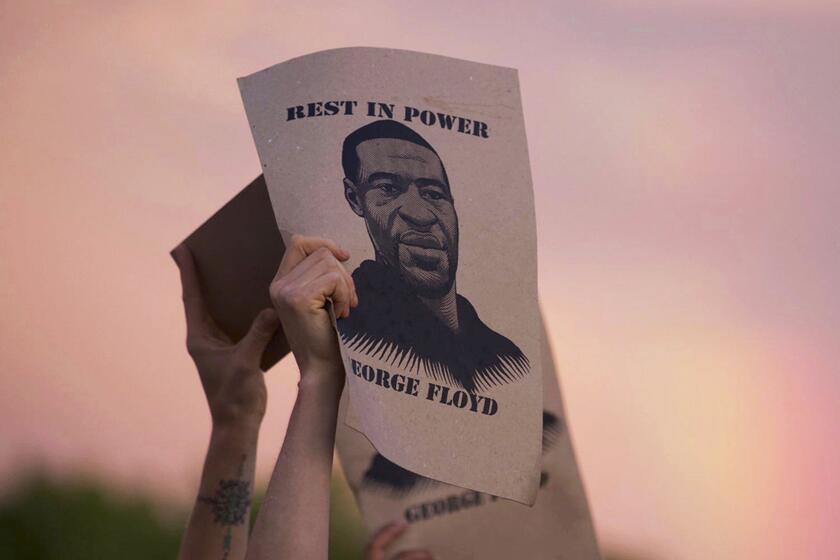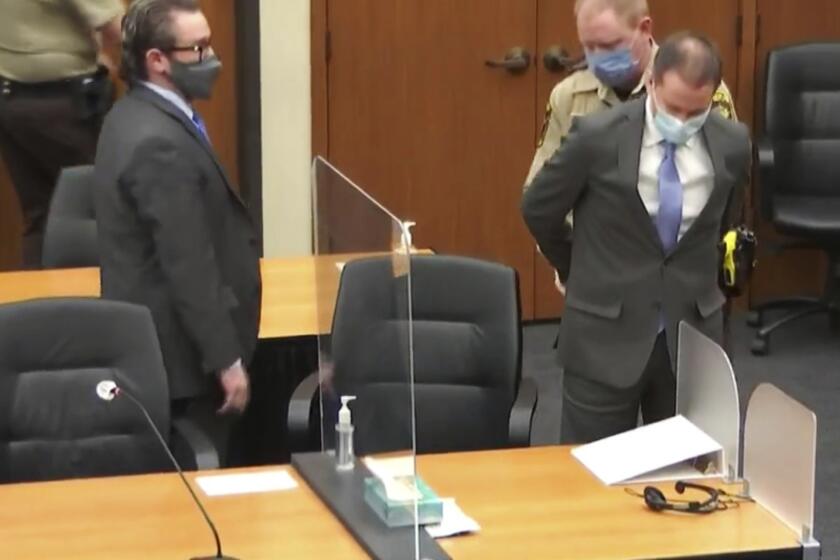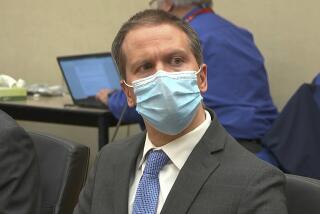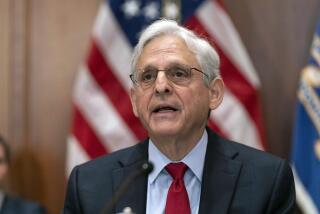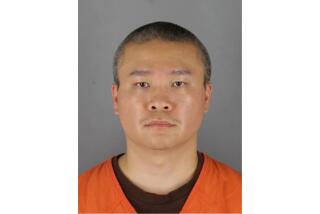Derek Chauvin is guilty of murdering George Floyd
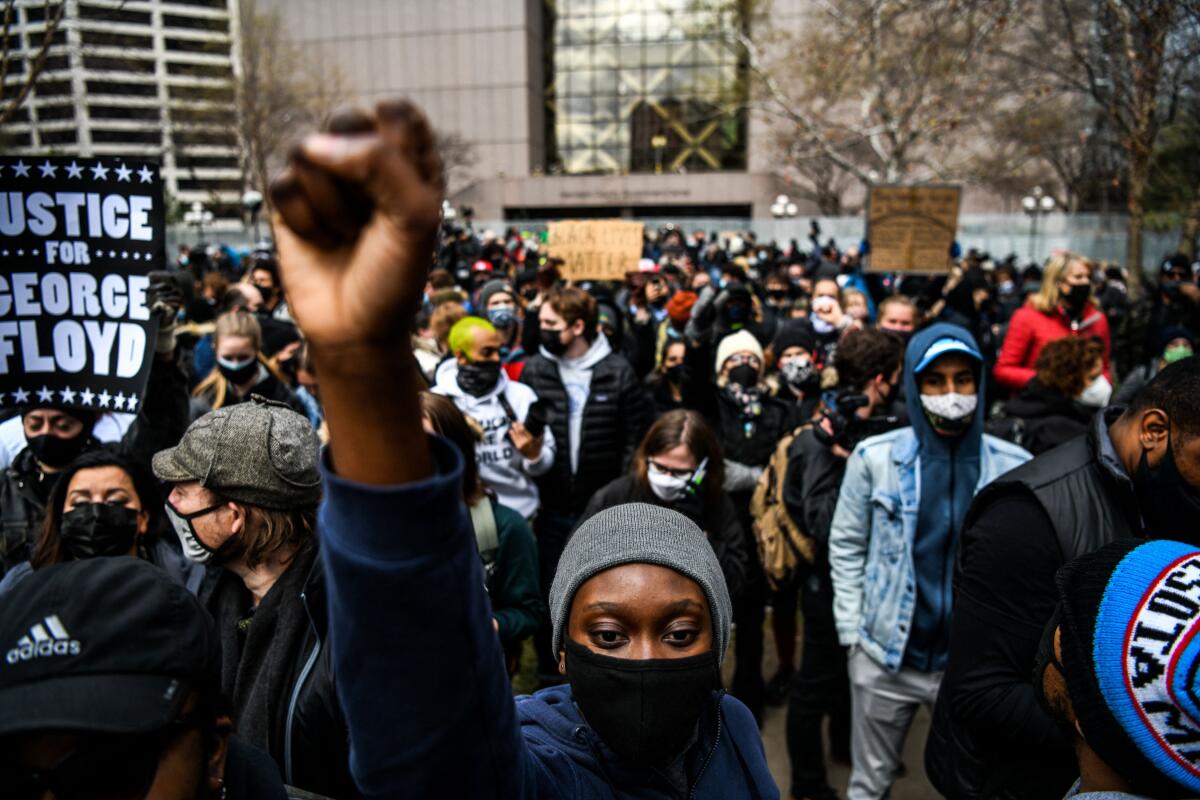
- Share via
MINNEAPOLIS — Former Minneapolis Police Officer Derek Chauvin was convicted Tuesday of murdering George Floyd in a landmark trial that centered on police brutality and spoke to a nation shaken over the last year by protests against racial injustice and demands to reform law enforcement.
The verdicts that ended the 16-day trial came in swift succession as Judge Peter Cahill read what the jury had rendered: Chauvin was guilty of second-degree murder, third-degree murder and manslaughter. They were all the counts against him, and in a matter of minutes, with his face hidden by a mask, Chauvin was handcuffed and led from the courtroom.
It took the jurors — six white, four Black, two who identify as biracial — less than 12 hours to reach their decision. Chauvin could face up to 40 years in prison.
The moment for many marked a step toward justice as the white former officer was convicted in the death of a Black man, whose cries — “I can’t breathe” — have been etched into the nation’s psyche. The outcome sparked celebrations but also led to a sobering realization that it took the harrowing video of Floyd’s death to deliver a rare conviction against a police officer in a case of excessive force.
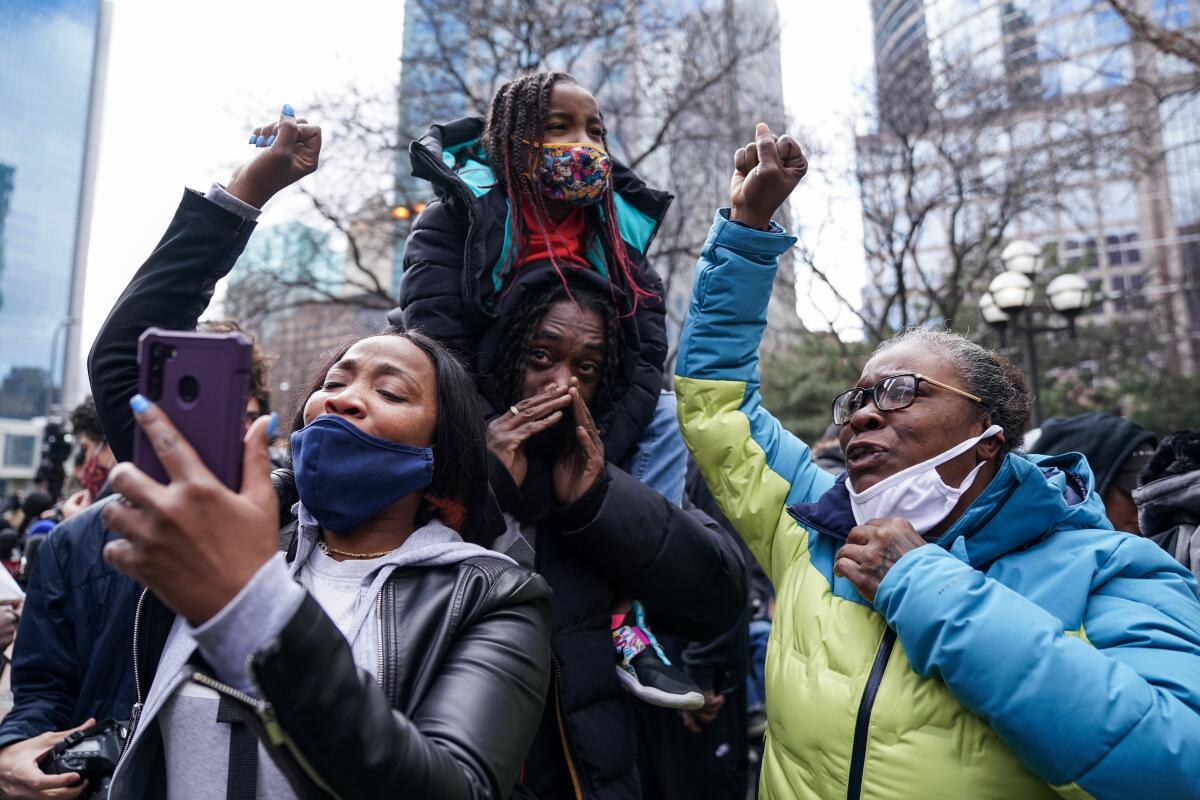
This city and the rest of the country were on edge in the days and final moments leading to the verdicts. Demonstrators gathered outside the fortified downtown Minneapolis courthouse, and law enforcement around the country braced for widespread protests similar to the ones that erupted from Los Angeles to Atlanta in the immediate days after Floyd’s death on May 25.
“We’re going to try to leave here today knowing that America is a better country,” said Benjamin Crump, a civil rights attorney who is representing the Floyd family. “America, let’s pause for a moment to proclaim this historical moment not just for the legacy of George Floyd, but for the legacy of America.”
He added, “We frame this moment for all of us, not just for George Floyd. This is a victory for those who champion humanity over inhumanity, those who champion justice over injustice, those who champion morals over immorality. America, let’s lean into this moment.”
Reaction to verdict in death of George Floyd
The Rev. Al Sharpton, who eulogized Floyd in Minneapolis, said he did not find pleasure in the moment.
“We don’t celebrate a man going to jail,” he said. “We rather George be alive.”
“Amen! Amen!” shouted a person in the back.
President Biden, alongside Vice President Kamala Harris at the White House, called the verdict “a giant step forward in the march towards justice in America.”
He said the incident “was a murder in the full light of day, and it ripped the blinders off for the whole world to see.”
Outside the courthouse, hundreds stood shoulder to shoulder. They prayed, they wept, they felt — on a cold, overcast day — that the criminal justice system had worked. At a nearby hotel, flanked by Sharpton and Crump, Floyd’s younger brother Philonise said he had prayed for a conviction.
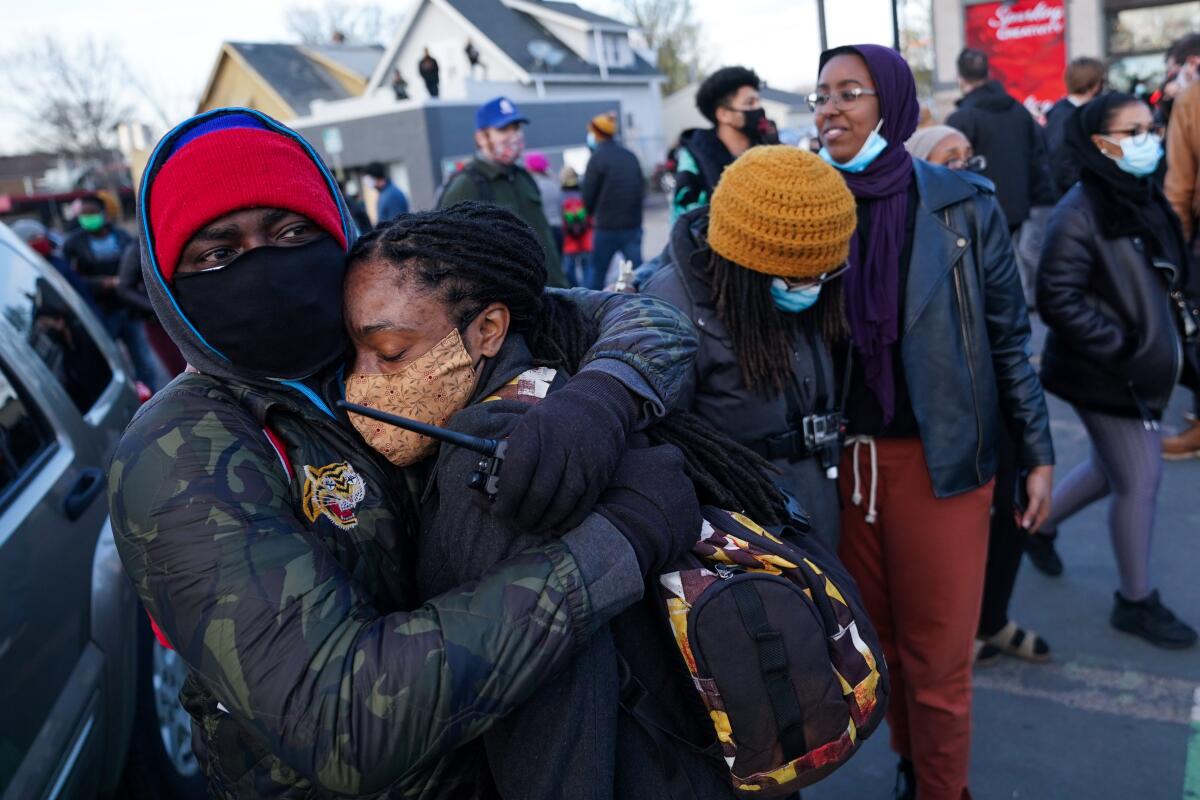
“It’s been a long journey,” he said, tears streaming down his face. He vowed to keep fighting for the other families of Black people killed by police who have not been vindicated by their day in court. It was only 10 miles away, and only about a week ago, that another Black man, Daunte Wright, was shot and killed by police in Brooklyn Center.
“I’m going to put up a fight every day, because I’m not just fighting for George anymore,” Philonise said. “I’m fighting for everybody around this world.”
The incident that would lead to a national reckoning that unfolded amid a relentless pandemic started in front of Cup Foods, a corner store in south Minneapolis. Police had been called after a clerk — who gave tearful testimony at the trial — discovered that Floyd had allegedly attempted to pass off a fake $20 bill. Chauvin and other officers arrived; bystanders started filming with their phones.
In the graphic video, which was presented as evidence and repeatedly played during the trial, several people urged Chauvin — who pressed his knee into Floyd’s neck for more than nine minutes — to stop applying pressure. Before his body went limp on the ground, Floyd, 46, also pleaded with the officer, telling him he couldn’t breathe.
“The force was too much. He was trapped,” prosecutor Steve Schleicher said of Floyd during closing arguments on Monday. “Trapped with the unyielding pavement underneath him.”
Schleicher added: “What the defendant did to George Floyd killed him.”
Prosecutors called dozens of witnesses — people at the scene, law enforcement, medical experts — to prove their case that Chauvin’s force was excessive and in violation of Minneapolis Police Department policy. Expert witness Martin Tobin, a pulmonologist, said Floyd died of asphyxia.
George Floyd’s death in police custody in May touched off a nationwide reckoning on race and led to the trial of ex-officer Derek Chauvin.
Minnesota Atty. Gen. Keith Ellison, whose office prosecuted the case, on Tuesday referred to those at 38th Street and Chicago Avenue who witnessed Floyd’s final moments: “They stopped and they raised their voices ... because they saw [Floyd’s] humanity. We owe them our gratitude for performing their civic duty. ”
Chauvin’s defense attorney Eric Nelson focused on Floyd’s drug use and heart problems, arguing that those factors caused his death. An autopsy found that Floyd had used fentanyl and methamphetamine and had underlying heart ailments.
Nelson argued that Chauvin had acted reasonably when he arrived on what the lawyer described as a volatile scene as officers struggled to get Floyd into the back of a squad car and bystanders began growing in numbers. He said his client used controlled takedowns and neck restraints to subdue Floyd that were in line with department policy.
Chauvin’s conviction for murder was rare: Most officers charged with killing people while on duty are acquitted. In recent years, two police officers in Dallas County, Texas, who killed unarmed Black people in separate cases were convicted of murder.
The Chauvin verdict — delivered in a courthouse guarded by National Guard troops — arrived at a crucial moment as a heightened focus on police brutality has led to calls to defund police departments and overhaul policing in some of the nation’s largest cities. State governments have also passed laws and regulations since Floyd’s death to hold police more accountable.
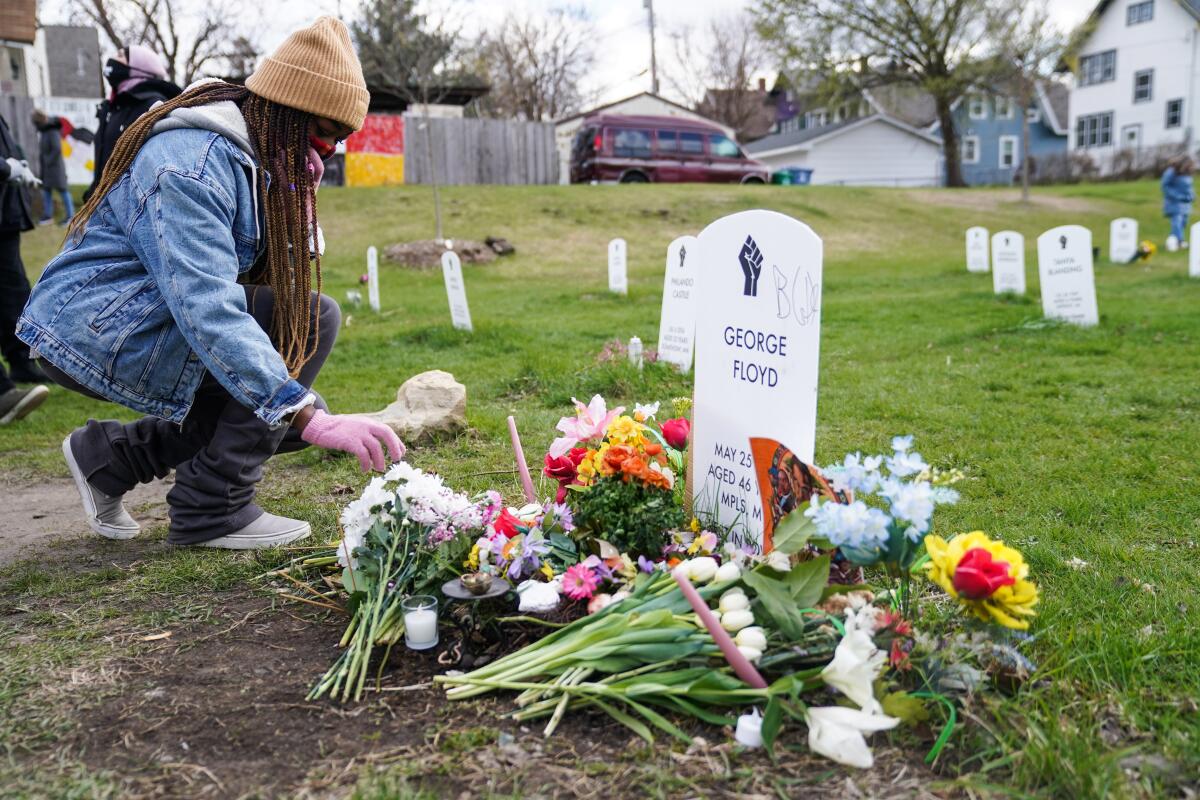
In December, the Minneapolis City Council voted to divert nearly $8 million of the department’s $180-million budget to community-based approaches to policing. Last month, the city announced it would also pay Floyd’s family $27 million in a settlement. The death is also under a federal civil rights investigation.
The jury’s decision Tuesday came amid increased anguish in the Minneapolis region. Wright was fatally shot by a white officer in the suburb of Brooklyn Center during a traffic stop. Officials said the officer, a 26-year veteran, mistook her gun for her Taser.
She has been charged with second-degree manslaughter. For several nights, protesters have taken to the streets in the Twin Cities calling on prosecutors to increase the charges to include murder. Dozens of people have been arrested, and shops and stores have been vandalized.
But the Chauvin verdict brought a degree of relief. In south Minneapolis, near the corner where Floyd took his last breaths, some people watched livestreams of the court proceedings on their phones. Chauvin stood — his eyes blinking and darting over a mask — as the judge read out the jury’s decision. The jury was then dismissed, and Chauvin, who had been impassive through much of the trial, turned and put his arms behind his back. Handcuffs were snapped around his wrists as he was led away.
Cheers filled the air on the corner.
People jumped and danced, holding Black Lives Matter flags, sometimes wearing them. Two women sobbed in each other’s arms.
Trey Hosley, 21, arrived in the area with his mother, Katie.
Hosley grew up three blocks from 38th and Chicago. Hosley, who is Black, said he was overwhelmed with relief and was a man of few words.
“I’m at a loss for words right now because I’m just so excited and happy,” Hosley said.
Justice, he said, had been served.
He said that while Tuesday’s verdict offered a moment of peace, he looked toward the future. Three other officers are set to go on trial in August for the death of Floyd.
“There’s still so much to do,” he said.
Special correspondent Tania Ganguli contributed to this report.
The jury in the trial of Derek Chauvin convicted the former Minneapolis police officer of murder in the death of George Floyd.
More to Read
Sign up for Essential California
The most important California stories and recommendations in your inbox every morning.
You may occasionally receive promotional content from the Los Angeles Times.
